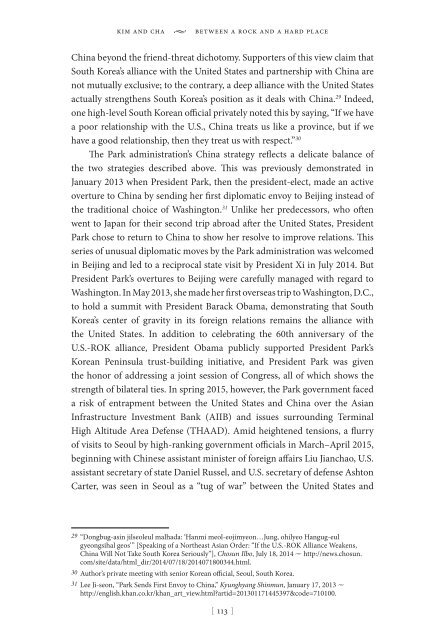You also want an ePaper? Increase the reach of your titles
YUMPU automatically turns print PDFs into web optimized ePapers that Google loves.
kim and cha • between a rock and a hard place<br />
China beyond the friend-threat dichotomy. Supporters of this view claim that<br />
South Korea’s alliance with the United States and partnership with China are<br />
not mutually exclusive; to the contrary, a deep alliance with the United States<br />
actually strengthens South Korea’s position as it deals with China. 29 Indeed,<br />
one high-level South Korean official privately noted this by saying, “If we have<br />
a poor relationship with the U.S., China treats us like a province, but if we<br />
have a good relationship, then they treat us with respect.” 30<br />
The Park administration’s China strategy reflects a delicate balance of<br />
the two strategies described above. This was previously demonstrated in<br />
January 2013 when President Park, then the president-elect, made an active<br />
overture to China by sending her first diplomatic envoy to Beijing instead of<br />
the traditional choice of Washington. 31 Unlike her predecessors, who often<br />
went to Japan for their second trip abroad after the United States, President<br />
Park chose to return to China to show her resolve to improve relations. This<br />
series of unusual diplomatic moves by the Park administration was welcomed<br />
in Beijing and led to a reciprocal state visit by President Xi in July 2014. But<br />
President Park’s overtures to Beijing were carefully managed with regard to<br />
Washington. In May 2013, she made her first overseas trip to Washington, D.C.,<br />
to hold a summit with President Barack Obama, demonstrating that South<br />
Korea’s center of gravity in its foreign relations remains the alliance with<br />
the United States. In addition to celebrating the 60th anniversary of the<br />
U.S.-ROK alliance, President Obama publicly supported President Park’s<br />
Korean Peninsula trust-building initiative, and President Park was given<br />
the honor of addressing a joint session of Congress, all of which shows the<br />
strength of bilateral ties. In spring 2015, however, the Park government faced<br />
a risk of entrapment between the United States and China over the Asian<br />
Infrastructure Investment Bank (AIIB) and issues surrounding Terminal<br />
High Altitude Area Defense (THAAD). Amid heightened tensions, a flurry<br />
of visits to Seoul by high-ranking government officials in March–April 2015,<br />
beginning with Chinese assistant minister of foreign affairs Liu Jianchao, U.S.<br />
assistant secretary of state Daniel Russel, and U.S. secretary of defense Ashton<br />
Carter, was seen in Seoul as a “tug of war” between the United States and<br />
29 “Dongbug-asin jilseoleul malhada: ‘Hanmi meol-eojimyeon…Jung, ohilyeo Hangug-eul<br />
gyeongsihal geos’ ” [Speaking of a Northeast Asian Order: “If the U.S.-ROK Alliance Weakens,<br />
China Will Not Take South Korea Seriously”], Chosun Ilbo, July 18, 2014 u http://news.chosun.<br />
com/site/data/html_dir/2014/07/18/2014071800344.html.<br />
30 Author’s private meeting with senior Korean official, Seoul, South Korea.<br />
31 Lee Ji-seon, “Park Sends First Envoy to China,” Kyunghyang Shinmun, January 17, 2013 u<br />
http://english.khan.co.kr/khan_art_view.html?artid=201301171445397&code=710100.<br />
[ 113 ]


